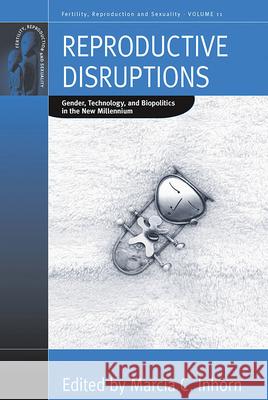Reproductive Disruptions: Gender, Technology, and Biopolitics in the New Millennium » książka
Reproductive Disruptions: Gender, Technology, and Biopolitics in the New Millennium
ISBN-13: 9781845455958 / Angielski / Miękka / 2008 / 256 str.
Reproductive Disruptions: Gender, Technology, and Biopolitics in the New Millennium
ISBN-13: 9781845455958 / Angielski / Miękka / 2008 / 256 str.
(netto: 111,71 VAT: 5%)
Najniższa cena z 30 dni: 115,87
ok. 30 dni roboczych.
Darmowa dostawa!
Reproductive disruptions, such as infertility, pregnancy loss, adoption, and childhood disability, are among the most distressing experiences in people's lives. Based on research by leading medical anthropologists from around the world, this book examines such issues as local practices detrimental to safe pregnancy and birth; conflicting reproductive goals between women and men; miscommunications between pregnant women and their genetic counselors; cultural anxieties over gamete donation and adoption; the contested meanings of abortion; cultural critiques of hormone replacement therapy; and the globalization of new pharmaceutical and assisted reproductive technologies. This breadth - with its explicit move from the "local" to the "global," from the realm of everyday reproductive practice to international programs and policies - illuminates most effectively the workings of power, the tensions between women's and men's reproductive agency, and various cultural and structural inequalities in reproductive health. Marcia C. Inhorn is Professor of Medical Anthropology at the University of Michigan, where she directs the Center for Middle Eastern and North African Studies. A specialist on infertility and assisted reproductive technologies in the Muslim Middle East, she is the author or editor of four books on the subject. Her publications include Quest for Conception: Gender, Infertility, and Egyptian Medical Traditions (University of Pennsylvania Press, 1994, winner of Eileen Basker Prize for outstanding research in gender and health), Infertility and Patriarchy: The Cultural Politics of Gender and Family Life in Egypt (University of Pennsylvania Press, 1996) and Local Babies, Global Science: Gender, Religion, and In Vitro Fertilization in Egypt (Routledge Press, 2003).
Reproductive disruptions, such as infertility, pregnancy loss, adoption, and childhood disability, are among the most distressing experiences in people’s lives. Based on research by leading medical anthropologists from around the world, this book examines such issues as local practices detrimental to safe pregnancy and birth; conflicting reproductive goals between women and men; miscommunications between pregnant women and their genetic counselors; cultural anxieties over gamete donation and adoption; the contested meanings of abortion; cultural critiques of hormone replacement therapy; and the globalization of new pharmaceutical and assisted reproductive technologies. This breadth - with its explicit move from the “local” to the “global,” from the realm of everyday reproductive practice to international programs and policies - illuminates most effectively the workings of power, the tensions between women’s and men’s reproductive agency, and various cultural and structural inequalities in reproductive health.Marcia C. Inhorn is Professor of Medical Anthropology at the University of Michigan, where she directs the Center for Middle Eastern and North African Studies. A specialist on infertility and assisted reproductive technologies in the Muslim Middle East, she is the author or editor of four books on the subject. Her publications include Quest for Conception: Gender, Infertility, and Egyptian Medical Traditions (University of Pennsylvania Press, 1994, winner of Eileen Basker Prize for outstanding research in gender and health), Infertility and Patriarchy: The Cultural Politics of Gender and Family Life in Egypt (University of Pennsylvania Press, 1996) and Local Babies, Global Science: Gender, Religion, and In Vitro Fertilization in Egypt (Routledge Press, 2003).











